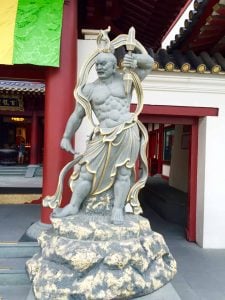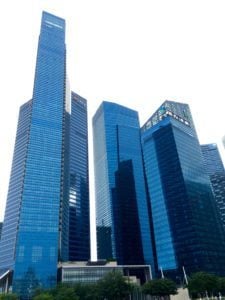If there is one area of crowdfunding where we consistently hear about unfilled, robust demand, it is Asian money looking to invest in high-quality real estate beyond the borders of their native country. While some real estate markets may be getting a bit hot, real estate as an investment class continues to perform well. Even if (or when) a dip occurs, in certain international markets the demand for real estate should remain rather strong for quite some time into the future.
 InvestaCrowd is a new platform that seeks to match this demand with a supply of “exclusive investment opportunities” to the registered members of the platform. InvestaCrowd states it will only work with reputable developers with a strong track record to provide access to finance on their platform.
InvestaCrowd is a new platform that seeks to match this demand with a supply of “exclusive investment opportunities” to the registered members of the platform. InvestaCrowd states it will only work with reputable developers with a strong track record to provide access to finance on their platform.
InvestaCrowd is the creation of Julian Kwan. Born in Australia, Kwan has spent the last 17 years in Asia – most recently Singapore. Having founded eight different companies, Kwan is a longtime real estate investor, developer, and manager. InvestaCrowd is providing access to investment opportunity in certain select markets like New York City or Syndey, Australia. The platform is providing access to both large commercial projects and residential projects at a lower minimum than typically expected of these types of deals.
Recently Crowdfund Insider spoke with Kwan to better understand his perspective and expectations for InvestaCrowd and the future of real estate crowdfunding.
Crowdfund Insider: InvestaCrowd is your 8th startup. What business sectors were the other seven companies?
 Julian Kwan: I lasted six months in the corporate world, at the head office of Multiplex, the developer of Sydney’s Olympic stadium. I then ventured off to China and have never stopped traveling and starting businesses since. My first business that I co-founded is still running, www.mailmanchina.com, and doing really well, it was alternative advertising and to understand how much things have changed, we were one of the first companies to put ads on the back of toilet doors and do SMS advertising which we thought was very cutting edge back in the day.
Julian Kwan: I lasted six months in the corporate world, at the head office of Multiplex, the developer of Sydney’s Olympic stadium. I then ventured off to China and have never stopped traveling and starting businesses since. My first business that I co-founded is still running, www.mailmanchina.com, and doing really well, it was alternative advertising and to understand how much things have changed, we were one of the first companies to put ads on the back of toilet doors and do SMS advertising which we thought was very cutting edge back in the day.
Since then I have started a real estate development company, Indecon.co, which developed or co-developed residential, boutique hotels (www.urbnhotels.com), loft office/ co-working space (10 years before WeWork was even conceived) and currently a villa project in Sri Lanka off the back of a real estate fund I also started.
We also started a hotel management company to manage the first hotel and others for large Chinese developers (for reference hotel management is a terrible business unless you have massive scale). Most of the 8 businesses have been related to real estate investment.
Crowdfund Insider: When did you decide to launch InvestaCrowd? What was the catalyst?
Julian Kwan: It is not often that something comes along that blows my mind. The crowdfunding concept did just that. The lightning speed at which the internet and technology is changing the old guard is simply awesome.
Since 2007 I have been successfully raising funds for my own real estate development projects in Asia. Most of the time the investor group has ended up being just that, a group. The concept of groups of people coming together to fund projects in real estate or in other industries is how the human race has been financing deals since the beginning of time. Crowdfunding to me is the 21st-century term we now use to explain this, and as we have the power of the internet, so the size of the crowd can now, literally, be infinite. Crowdfunding is just beginning in Asia, but we think it will eventually explode and surpass USA and Europe. Exciting times.
 Crowdfund Insider: What type of demand are you seeing from Asian investors to invest in real estate? Which countries are most active?
Crowdfund Insider: What type of demand are you seeing from Asian investors to invest in real estate? Which countries are most active?
Julian Kwan: Asia is a complex and diverse market, and it is somewhat impossible to just bundle all these countries into a single category. That being said, you have two types of markets. Japan/Korea/Hong Kong and Singapore, which are developed markets with clear rule of law and protection for investors. They are also some of the most expensive real estate markets in the world, so there are no returns and hardly any projects unless you have huge money to invest. Then you have all the other countries, China, India, Vietnam,Thailand, Indonesia etc….which are completely opposite to the developed Asian countries. Their dynamic’s are very different in that there are many real estate investment “opportunities” but the rule of law is opaque, investor protection is weak and finding good trustworthy partners a huge challenge. Ownership laws for foreign investors are also complex, complicated and risky. So you have a situation in both types of countries where investors are seeking good quality transactions but face huge challenges to execute. Currently we have investors from 25 countries but with the majority of demand coming from China, Japan, Hong Kong, Singapore and Indonesia.
 Crowdfund Insider: How do you manage these diverse regulatory environments?
Crowdfund Insider: How do you manage these diverse regulatory environments?
Julian Kwan: Luckily, and on purpose, my cofounder Alice Chen, is a US real estate attorney and General Counsel for InvestaCrowd. We have spent two years working through the vast regulatory challenges and also have 3 law firms in different jurisdictions helping us forge the path forward.
Platforms must be aware of the raise side and investment side of any transaction, so we have to be cautious to be raising funds under the rules of where we are raising and then placing the investment in a legal and correct way for the deployment of capital. Cross border investing is complex, but our value proposition is to simplify this for investors.
 Crowdfund Insider: How are you sourcing your deals? Which countries do you target for investment opportunities?
Crowdfund Insider: How are you sourcing your deals? Which countries do you target for investment opportunities?
Julian Kwan: We are solely focused on the global gateway cities of the world in the most desired and liquid markets on the planet. For us, that means Australia, the UK and USA, and specifically Sydney, London and New York real estate. We were born and raised in these cities and understand the rules, the laws and the deals. We also have contacts with the best developers in these markets and also know ( from experience investing and developing in Asia) , that investors are protected and there is transparency in the deals with the right partners.
It is no secret that real estate development and developers often have poor reputations as a whole, because of all the games and ways that they can take money out of any project. As such our view is that it is impossible to “crowdfund” debt and equity deals in Asia, as you need to find developers who are 100% trustworthy and transparent, and more importantly all costs of the project must be outlined clearly before the deal is introduced to investors. If you have developed and invested in Asian real estate, (outside of Japan/Korea/Hong Kong and Singapore) you would know that any project requires multiple levels of development approvals, and you then have no choice but to navigate the corruption and extortion along the way to get anything done, so how do you put that into the pro forma and investment memorandums’ for the investors?? You can’t.
We only source deals through personal relationships and we only list deals that we would personally invest into ourselves. We treat all investors at InvestaCrowd as family and friends, because so many of them are.
 Crowdfund Insider: Are you focusing on specific development types?
Crowdfund Insider: Are you focusing on specific development types?
Julian Kwan: We look for developers with the right track records in the locations we like. We are starting with simple residential and commercial projects, but envisage projects on our platform across all development types, industrial, student accommodation etc.
It is all about the developers running the project and they must have some scale so they can weather a downturn or any dips in the market or project. We also only work with companies who we think value their reputations above anything else, so they would choose to personally lose money and still deliver a project for investors, rather than take a short term gain and leave investors hanging by running off into the sunset. Developers also need to understand how this all works, we wrote this to help them out: What developers should consider to begin crowdfunding.
We are looking to offer risk-adjusted returns in both debt and equity positions. It is too early to focus on just one type of deal, and Asian investors are much more opportunistic than their USA counterparts. We have successfully funded equity deals in Sydney and New York and launching some London projects now.
Finding good product has also taken a long time and we are extremely cautious about the types and quality of deals we are listing. We are quality over quantity and that has taken time to build. There are other platforms in Asia selling hopeless and risky real estate we would not touch with a 10 foot pole (i.e apartments in Cambodia and Myanmar, which in fact is not even crowdfunding but just Groupon for apartment buying, but in a nascent industry with a confused audience, they seem to get away with it, and people are buying.
Crowdfund Insider: You offer both debt and equity opportunities. Are you doing more debt or equity deals?
Julian Kwan: We just started launching deals and have funded equity deals to date, debt deals are in the pipeline.
 Crowdfund Insider: The startup scene in Singapore is pretty vibrant. The government is very supportive of early stage companies – has this been helpful for InvestaCrowd?
Crowdfund Insider: The startup scene in Singapore is pretty vibrant. The government is very supportive of early stage companies – has this been helpful for InvestaCrowd?
Julian Kwan: Yes, anytime regulators and government are behind changes to help grow an industry it is a good thing.
Singapore has been the financial capital of South East Asia for many years and they will undoubtedly own the fintech capital of SEA tag too. We also think now that China has taken over Hong Kong, many businesses will migrate from HK to SG over the coming years due to better regulatory and business opportunities. Hong Kong has lost its key value proposition, which was the doorway to China, because now you simply go directly to Beijing or Shanghai if you want to business in China. There is no government in the world that is more behind the startup scene than the Singapore government, they are extremely progressive and intelligent and are leaps and bounds ahead of anyone else we can see. The regulators have even set up a $225 mil fund to invest into the industry – here, that thinking and commitment is truly light years ahead of places like Australia.


